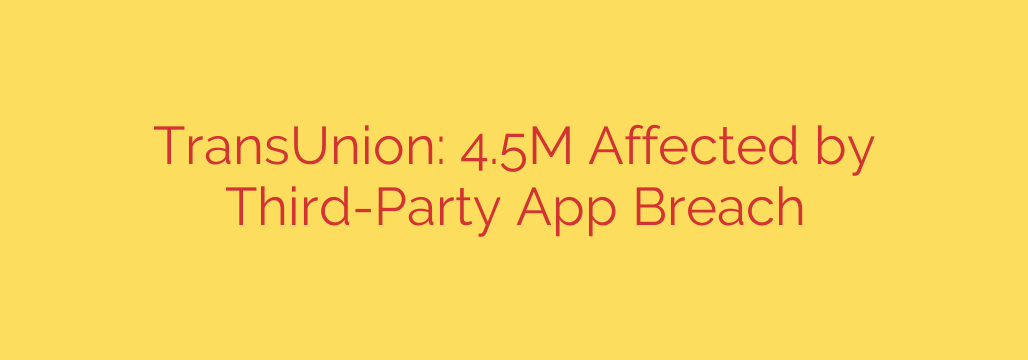
TransUnion Data Breach: Millions Affected Through Third-Party App
A significant data breach involving consumer information held by the credit bureau TransUnion has come to light, impacting a vast number of individuals. The incident did not stem from a direct attack on TransUnion’s core systems but rather through a vulnerability in a third-party application that interfaces with the credit agency’s data.
This breach underscores a growing security challenge in our interconnected digital world: the risk posed by third-party vendors. Here’s what you need to know about the incident and the critical steps you should take to protect your personal and financial information.
Understanding the Breach
The security failure occurred within a software application used by a TransUnion partner. Attackers exploited a weakness in this app to gain unauthorized access to a database containing sensitive consumer information. While TransUnion’s own servers were not compromised, the outcome is the same for those affected: their personal data is now in the hands of malicious actors.
According to reports, approximately 4.5 million consumers have been impacted by this breach. The exposed data is highly sensitive and can be used for a wide range of fraudulent activities, including identity theft and financial scams.
What Personal Information Is at Risk?
When a credit bureau’s data is exposed, the compromised information is often a goldmine for cybercriminals. The specific details vary, but breaches of this nature typically involve the exposure of key Personally Identifiable Information (PII), such as:
- Full names
- Social Security numbers (SSNs)
- Dates of birth
- Driver’s license numbers
- Financial account numbers and details
- Credit history information
This is precisely the type of data that allows criminals to open new lines of credit, file fraudulent tax returns, or impersonate you for other malicious purposes.
Your Action Plan: How to Protect Your Identity Now
If your information has been compromised, proactive and immediate steps are essential to minimize the potential damage. Even if you haven’t received a notification, it is wise to act as if your data was included.
Place a Credit Freeze. This is the single most effective action you can take. A credit freeze restricts access to your credit report, making it difficult for identity thieves to open new accounts in your name. You must contact all three major credit bureaus—Equifax, Experian, and TransUnion—to place a freeze. This service is free and does not affect your credit score. You can temporarily lift the freeze whenever you need to apply for new credit.
Review Your Credit Reports. You are entitled to a free credit report from each of the three bureaus every week through AnnualCreditReport.com. Request your reports and scrutinize them for any accounts, inquiries, or addresses you don’t recognize. Report any fraudulent activity immediately to the credit bureau and the creditor involved.
Monitor Your Financial Accounts. Don’t wait for your monthly statement. Log in to your bank, credit card, and other financial accounts regularly. Look for any suspicious transactions, no matter how small, as criminals often test accounts with minor purchases before making larger ones. Set up transaction alerts for immediate notification of account activity.
Be Vigilant Against Phishing Attempts. Cybercriminals will use stolen data to craft highly convincing phishing emails, text messages (smishing), and phone calls (vishing). They may pose as your bank, a government agency, or a company you do business with. Never click on unsolicited links or provide personal information in response to an unexpected request. Always verify the request by contacting the organization through an official, known channel.
Strengthen Your Digital Security. Use strong, unique passwords for every online account. Enable two-factor authentication (2FA) wherever possible, as it adds a critical layer of security that can block unauthorized logins even if your password is stolen.
The bottom line is that third-party breaches are becoming increasingly common. While you can’t control the security practices of every company that holds your data, you can take decisive action to protect your own identity. By freezing your credit and remaining vigilant, you can build a strong defense against fraud.
Source: https://go.theregister.com/feed/www.theregister.com/2025/08/28/transunion_support_app_breach/








